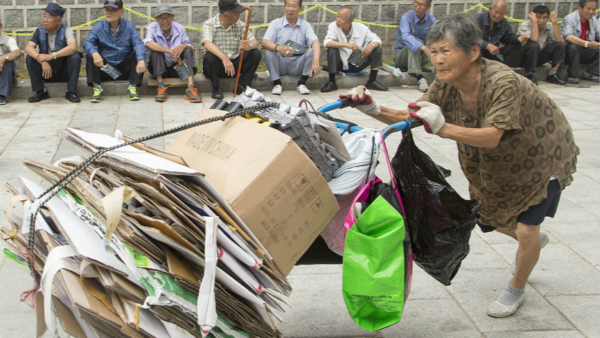(单词翻译:单击)
For the past four years, Oh Soon-ja has pushed her rusty cart through the streets of Seoul, collecting boxes and cardboard.
Oh Soon-ja推着生锈的手推车在首尔走街串巷,捡拾盒子和硬纸板,这样的日子已经过了4年。
“It’s hard for me to move around at my age but I have no choice — there’s no one to support me and my husband,” says the 68-year-old, who makes Won20,000 ($17.50) a day for her efforts. “It’s my fate — I have to live with it.”
“我这个年纪出去四处转悠有些困难,但没有办法——没人赡养我和我的丈夫。”这位靠自己努力每天赚2万韩元(合17.50美元)的68岁老人表示,“这是我的命——我只能受着。”
Poverty afflicts almost half of Korea’s elderly — a generation that was once the lifeblood of the country’s remarkable postwar transformation into an advanced economy. With the basic monthly state pension of Won200,000 barely sufficient for food and lodging, many resort to menial or degrading jobs to make ends meet.
贫困折磨着近乎半数的韩国老年人——他们这代人曾是韩国战后迈向发达经济体过程中的中坚力量。每月20万韩元的基本养老金仅够维持食宿开销,许多人只能靠从事卑微或低贱的工作来维持生计。
Some even resort to prostitution. In a leafy park nestled beneath the high-rises of downtown Seoul, women as old as 80 seek clients to take to the neighbourhood’s rundown motels. The “Bacchus Ladies”, named after the energy drink they flog as an opening gambit, have come to symbolise the profound demographic challenges facing the rapidly ageing Asian nation.
有些人甚至从事卖淫。在首尔市区高楼掩映下一处郁郁葱葱的公园里,有80岁高龄的老妇在拉客,带至附近破旧的汽车旅馆。这些“巴克斯女郎”(Bacchus Ladies,这一叫法源于她们作为开场白兜售的巴克斯能量饮料)象征着这个迅速老龄化的亚洲国家所面临的严峻人口挑战。
“The sole reason they do this kind of work is to eke out a living,” says Lee Ho-sun, a professor at Korea Soongsil Cyber University and an authority on the sex workers — none of whom was willing to talk to the Financial Times. “These women feel disgraced and scorned doing this job in their old age. It causes them a lot of physical pain.”
“他们从事这一行当的唯一原因就是为了谋生,”韩国崇实网络大学(Korea Soongsil Cyber University)教授、性工作者研究权威Lee Ho-sun表示,“这些女性为晚年从事这种工作感到脸上无光和被人看不起。这会给她们带来切实的痛苦。”没有一位性工作者愿意接受英国《金融时报》的采访。
The problem of old-age poverty is only going to get worse.
老年贫困问题只会变得越来越糟糕。
Amid dramatically increased lifespans, a falling birth rate and a slowing economy, the elderly population is ballooning. By 2060, 41 per cent of South Koreans are projected to be over 65, up from 13 per cent in 2015.
伴随寿命大幅延长、出生率下降及经济放缓,韩国老年人口数量正在不断膨胀。到2060年,41%的韩国人将超过65岁,而2015年时的比例为13%。
A recent study found that by 2030 Koreans will have the world’s longest lifespans, with women living on average until 90.
最近一项研究发现,到2030年,韩国将成为全世界人均寿命最长的国家,韩国女性的平均寿命将达到90岁。
And the trend is not limited to South Korea, with many western countries, particularly in Europe, facing a demographic shake-up as low fertility rates meet soaring life expectancy. By 2050, 17 per cent of the world’s population — or 1.6bn people — will be over 65 years old, up from 8.5 per cent in 2015, according to a report by the US government.
这一趋势并不仅限于韩国,许多西方国家——尤其是欧洲国家——也面临人口结构的巨变,原因是低生育率再加上预期寿命大幅延长。美国政府的一份报告显示,到2050年,全球17%的人口(16亿人)将超过65岁,而2015年时的比例为8.5%。
Demographic pressures in South Korea pose a huge challenge to the nation’s economy and plans by President Moon Jae-in to jump-start growth, which has slowed to an annual rate of about 2.8 per cent in recent years.
国内的人口压力对韩国经济以及总统文在寅(Moon Jae-in)的刺激增长计划构成了巨大的挑战,近年来韩国经济年增速已经放缓至2.8%左右。
The country’s birth rate, already the lowest in the OECD, is in freefall. Only 406,000 babies were born last year, down from 867,000 in 1981. In the first three months of this year the birth rate was down 12 per cent year on year. By 2031, South Korea’s population is expected to be in decline.
韩国的出生率已经处于经合组织(OECD)国家中最低水平,并且还在大幅下滑。韩国每年的新生儿数量已从1981年的86.7万下降到去年的区区40.6万。今年前三个月的出生率同比下降了12%。到2031年,韩国人口数量预计将出现下降。
“As the elderly population increases and the working population declines, the economy is going to shrink considerably,” says Lee Sam-sik, head of the Ageing Society Research Institute at Hanyang University.
“随着老年人口增加、劳动人口数量下降,韩国经济将出现大幅萎缩,”汉阳大学(Hanyang University)老龄化社会研究所所长Lee Sam-sik说。
“The burden on young people will be huge post-2030, when the baby boom generation becomes senior citizens [and stops working],” he adds, pointing out that South Korea’s baby boom came about 10 years after the west’s because of the Korean war. “We urgently need to draft a broad roadmap to increase the low fertility rate.” Lower education and childcare costs could help, says Lee Sam-sik.
“2030年之后,当婴儿潮一代成为老年人(不再工作),年轻人身上的负担将非常大,”他指出,因为朝鲜战争的缘故,韩国的婴儿潮比西方晚到10年左右。“我们迫切需要绘制一条大致的路线图来提高偏低的生育率。”Lee Sam-sik表示,降低教育及儿童保育成本可能有用。
Lee Sang-eun, a professor at Soongsil University, expects the nation’s current unemployment problems will soon give way to labour shortages. “If there are no workers available, companies will not increase investment,” he says. “Economic growth will be much reduced. That is certain.”
崇实大学(Soongsil University)教授Lee Sang-eun预计,韩国目前的失业问题将很快让位给劳动力短缺。“如果雇不到人手,企业不会增加投资,”他表示,“经济增速将大大放缓。这是肯定的。”
Few of South Korea’s elderly have prepared for retirement and many ploughed vast sums into their children’s education, leaving them strapped in later life, says Prof Lee of Korea Soongsil Cyber University.
崇实网络大学的Lee Ho-sun教授表示,韩国老年人很少为退休做好了准备,许多人把大量资金投入了子女教育中,致使自身晚年生活拮据。

She adds that with the youth unemployment rate hovering close to 10 per cent, many elderly receive little support from their own children. In August, Mr Moon vowed to increase basic pensions for the most needy to Won300,000 a month by 2021.
她还表示,随着青年失业率徘徊在接近10%的水平,许多老年人得不到自己子女的支持。今年8月,文在寅誓言到2021年将最贫困人口的基本养老金提升至每月30万韩元。
For box collector Ms Oh, this is too little too late. “I wish the government would provide some support but I’ve given up on expecting anything from them.”
对于捡拾纸箱的Oh Soon-ja而言,这些钱太少,也太迟了。“我希望政府能提供救助,但我已经放弃了对他们的任何期望。”
Choi Byung-woo, 72, blames his poverty on poor investments made by his wife. “I get Won200,000 a month from the government, which is not enough to cover my daily expenses. My life is miserable.”
72岁的Choi Byung-woo将自己的窘境归咎于妻子的糟糕投资。“我每月从政府拿到20万韩元,这根本不够我的日常开支。我的日子过得很悲惨。”


